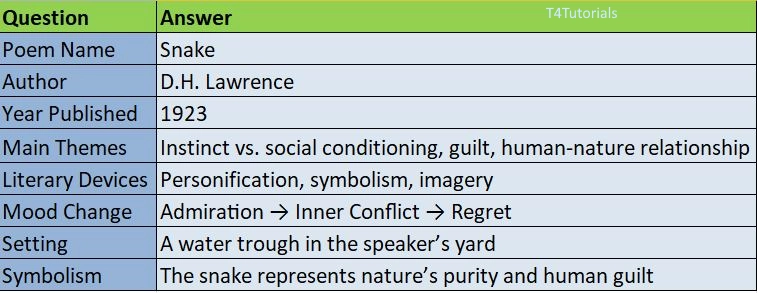Summary:
“Snake” is a poem by D.H. Lawrence that explores the complex relationship between humans and nature, particularly the conflict between instinct and societal conditioning. The poem describes an encounter between the speaker and a snake at a water trough on a hot day. Initially, the speaker admires the snake’s grace and presence, feeling honored by its visit. However, influenced by societal beliefs that snakes are dangerous, he experiences an internal struggle between admiration and fear. Eventually, he acts on this ingrained fear and throws a log at the snake, an action he immediately regrets.
The poem delves into themes such as the conflict between civilization and nature, guilt, and lost innocence. Lawrence uses vivid imagery, personification, and symbolism to convey the beauty of the snake and the speaker’s moral dilemma. The poem ultimately suggests that human interference in nature often leads to unnecessary harm and regret.

Score: 0
Attempted: 0/10
Subscribe
| Question | Answer |
| Poem Name | Snake |
| Author | D.H. Lawrence |
| Year Published | 1923 |
| Main Themes | Instinct vs. social conditioning, guilt, human-nature relationship |
| Literary Devices | Personification, symbolism, imagery |
| Mood Change | Admiration → Inner Conflict → Regret |
| Setting | A water trough in the speaker’s yard |
| Symbolism | The snake represents nature’s purity and human guilt |